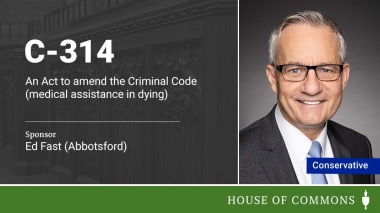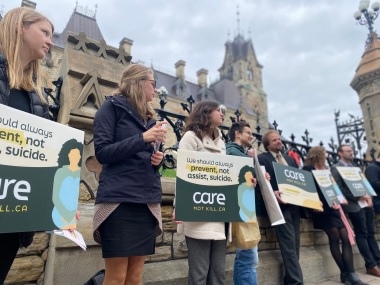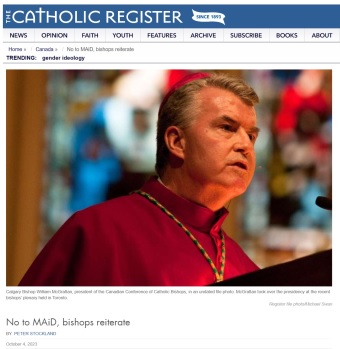 Canadians appear to be agreed that the Liberals are moving too fast in implementing Medical Assistance in Dying (MAiD) legislation, but the government is clearly determined to carry out its program.
Canadians appear to be agreed that the Liberals are moving too fast in implementing Medical Assistance in Dying (MAiD) legislation, but the government is clearly determined to carry out its program.
On October 18, most Liberals, supported by the Bloc Quebecois, voted down a Private Member’s Bill proposed by Abbotsford Member of Parliament Ed Fast.
Bill C-314 would have excluded a mental disorder from being considered a grievous and irremediable medical condition for the purposes of Medical Assistance in Dying. This would mean that no one would be eligible for MAID for mental illness alone.
An email from ARPA Canada – whose mission is “to educate, equip, and encourage Reformed Christians to political action, and to bring a biblical perspective to our civil authorities” and which had supported the bill – stated, immediately following the vote:

ARPA Canada supporters showing support for Bill C-314 October 18.
While C-314 didn’t quite pass [167 opposed, 150 in favour], this is the closest a bill like this has come to passing in recent years in the House of Commons! The entire NDP caucus and numerous Liberals voted for it!
Cardus, a Christian think tank, immediately sent out this statement:
“Parliament’s rejection of Bill C-314 is a tragic mistake that ignores the will of the vast majority of Canadians. Recent polling shows that 82 percent of Canadians say the federal government should focus on improving access to mental health care before expanding euthanasia and assisted suicide to those who struggle with mental illness.
Parliament should have listened to the unacceptably high number of Canadians who say they encounter barriers in accessing mental health care – or the 64 percent of Canadians who fear those with mental illness will become even more vulnerable when euthanasia and assisted suicide become available to them next March.
By not even voting to send the bill for further consideration at committee, Parliament has demonstrated an unwillingness to listen to these very real concerns about providing death for mental illness when Canadians still have problems accessing proper care for life with mental illness.”
Fast himself stated:
I am profoundly disappointed by the fact that a large majority of Liberal MPs, supported by the Bloc, voted against the Bill. In so doing, they failed to defend Canada’s most vulnerable against the creeping scope of MAiD as their government fails to deliver on its promises to provide the necessary mental health and social supports that would allow the mentally ill to live lives of dignity and meaning.
Christian support for Fast
Fast, a Christian himself, knew he could rely on the support of several Christian groups in his attempt to get Bill C-314 through Parliament. Two major Christian bodies have been active:
- Evangelical Fellowship of Canada
For example, the Evangelical Fellowship of Canada (EFC) has a page referring to numerous talks, articles and initiatives to stop the progress of MAiD, including links to a MAiD Expansion Action Kit and 53-page paper by EFC President David Guretzki outlining a “faithful Christian response to assisted suicide and euthanasia.”
The day before the vote, the EFC wrote about the vote as “a window of opportunity”:
This week there is the chance to walk back part of the rapid expansion of euthanasia in Canada.
On March 17, 2024, five months from today, people with mental illness as their only underlying medical condition will be eligible for medical assistance in Dying, or MAiD. The law has already passed to make this change, with a delay before this provision came into effect.
The EFC also declared October 22 a MAiD Day of Payer.
- Canadian Conference of Catholic Bishops
The Canadian Conference of Catholic Bishops (CCCB) released a statement this spring which begins:
The Permanent Council of the Canadian Conference of Catholic Bishops (CCCB) remains committed to advocating for a culture of social responsibility and care for human life at all stages and in all circumstances.
In recent years, Canadians have grown in their realization that persons living with mental health challenges, including mental illnesses, and their caregivers require more support, encouragement and resources. Individuals and families can attest that healing and hope are possible with the accompaniment of qualified mental health caregivers as well as the support of families and engaged communities. . . .
As members of the CCCB Permanent Council, we remain profoundly concerned about, and strongly disagree with the expansion of the ‘eligibility criteria’ for euthanasia and assisted suicide (i.e., ‘Medical Assistance in Dying’ or ‘MAiD’) to persons whose sole medical condition is a mental illness.
 The incoming president of the CCCB stated October 4 “that so-called Medical Assistance in Dying is a no-go for institutions and associations the operate under the Church’s name.”
The incoming president of the CCCB stated October 4 “that so-called Medical Assistance in Dying is a no-go for institutions and associations the operate under the Church’s name.”
An October 17 article on the Angus Reid Institute site was titled ‘Medical Assistance in Dying: Majority say religiously affiliated hospitals should not be forced to provide MAiD.”
The B.C. Catholic featured a positive interview with Fast October 12.
One major ecumenical group seems to be avoiding the issue. The Canadian Council of Churches – made up of most mainline Protestant denominations, a few evangelical groups, the Canadian Conference of Catholic Bishops and others – has not opposed MAiD legislation.
Looking ahead
It is clear that Fast has not give up his fight. Following the defeat in Parliament, he said:
As a general comment about the state of MAiD in Canada, I believe that the Trudeau government has moved too far and too fast in its zeal to expand the availability of MAiD to vulnerable Canadians such as the mentally disordered and children. There is absolutely no national consensus to expand MAiD to those suffering from mental disorders.
A large majority of Canadians oppose moving ahead with such an expansion without the appropriate mental health and social supports having been addressed. Not even the mental health community has achieved consensus on such critical issues as irremediability (incurability), suicidal ideation and competency.
Canadians deserve a fully-informed national discussion on the merits of including the mentally disordered under Canada’s MAiD legislation before fully normalizing assisted suicide for the most vulnerable. Half-measures and window-dressing will not suffice for this consequential life and death issue.
